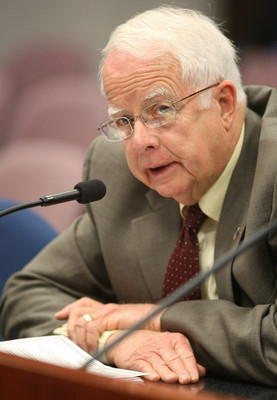Stewart pursues stronger law for sex offenders

CARSON CITY — Nevada lawmakers debated a bill Tuesday that would provide additional protections to victims of sex offenders, by prohibiting the offenders from moving within 1,000 feet of the victims.
Assemblyman Lynn Stewart, R-Henderson, who introduced AB325, told the Assembly Corrections, Parole and Probation Committee that as the law is written, offenders could move across the street or next door to their victims.
Committee members also were told by a young mother, who was raped by her babysitter’s boyfriend when she was four years old, that her attacker years later moved next door to her grandmother, where the victim used to live.
"I’m living this whole thing all over again when I go to my grandmother’s house," she said. "I no longer want to go over there. I have to face him looking at me, laughing at me."
Lawmakers were told that in some instances, sex offenders have a difficult time finding a place to live because entire towns are off-limits. One offender moved to a rural area to comply with the rules, but when housing developments sprung up around him, he had to move away, Stewart said.
To remedy that, the bill also would give some latitude to sex offenders who are attempting to comply with the law.
Stewart told the committee about an 18-year-old who had consensual sex with a 14-year-old, and then was convicted as a sex offender after parents objected. He said the couple later married, but under a strict reading of the current law the husband could be required to move over 1,000 feet away from his now-wife.
"Now they are married and have kids," Stewart said. "We don’t want to break up that family."
But some lawmakers did not want to make it too easy on sex offenders.
"That’s understandable that we would have some leeway there," said Assemblyman Ty Cobb, R-Reno. "But I don’t think we should be bending over backwards for them to let them live wherever they want to live."
Mark Woods, deputy chief of the state Division of Parole and Probation, proposed an amendment to allow the division some discretion in dealing with the 1,000-foot rule.












